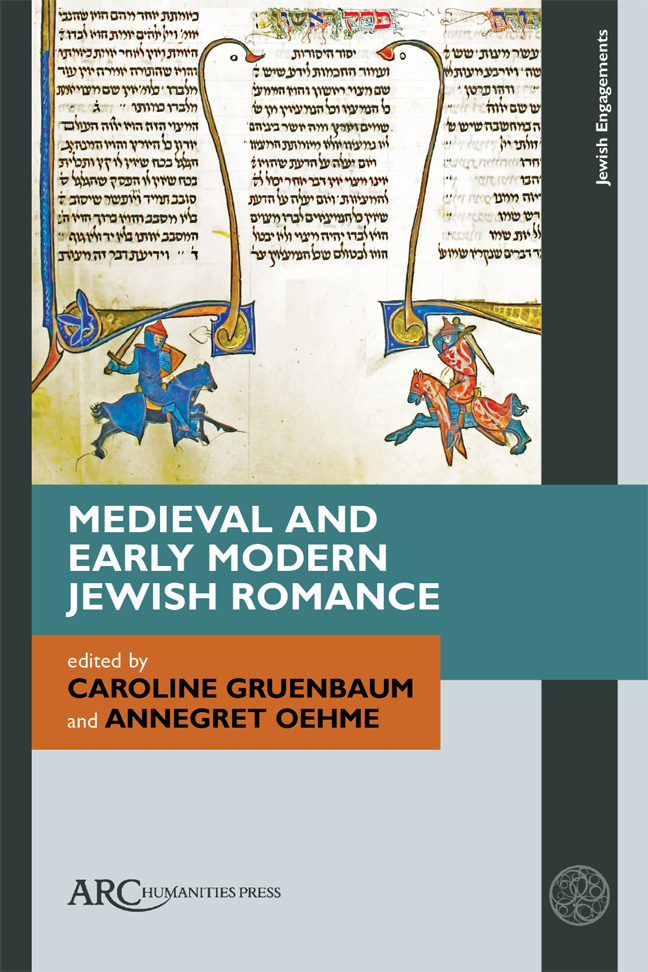Book contents
- Frontmatter
- Dedication
- Contents
- List of Illustrations
- Acknowledgements
- Introduction
- The Zohar as Medieval Jewish Romance
- Letters of Loathing: Immanuel of Rome and Romance Epistolary
- Illuminated Knights and Tales of Romance in the Rothschild Miscellany
- The Queen Nudatio: A Romanesque (?) Topos in Israel Caslari's Roman d’Esther
- At the Court of the Demon King: The Story of the Jerusalemite and Chivalric Romance
- Melekh Artus as a Jewish Romance: Horizons of Expectation and Genre Configurations
- A Friend in Need is a Friend Indeed?Friendship, Love, and Loyalty in the Yiddish Seven Sages of Rome
- Stealing Back One's Husband: The Yiddish Mayse mi-Danzek in the Context of Early Modern German Cross-Dressing Narratives
- Romance Elements in Meshal Haqadmoni by Isaac Ibn Sahula: A New Reading
- Afterword: Jewish Romance in Search of Identity
- Select Bibliography
- Index
Introduction
Published online by Cambridge University Press: 18 February 2024
- Frontmatter
- Dedication
- Contents
- List of Illustrations
- Acknowledgements
- Introduction
- The Zohar as Medieval Jewish Romance
- Letters of Loathing: Immanuel of Rome and Romance Epistolary
- Illuminated Knights and Tales of Romance in the Rothschild Miscellany
- The Queen Nudatio: A Romanesque (?) Topos in Israel Caslari's Roman d’Esther
- At the Court of the Demon King: The Story of the Jerusalemite and Chivalric Romance
- Melekh Artus as a Jewish Romance: Horizons of Expectation and Genre Configurations
- A Friend in Need is a Friend Indeed?Friendship, Love, and Loyalty in the Yiddish Seven Sages of Rome
- Stealing Back One's Husband: The Yiddish Mayse mi-Danzek in the Context of Early Modern German Cross-Dressing Narratives
- Romance Elements in Meshal Haqadmoni by Isaac Ibn Sahula: A New Reading
- Afterword: Jewish Romance in Search of Identity
- Select Bibliography
- Index
Summary
MEDIEVAL ROMANCE INCLUDES some of the most well-known medieval texts and authors within its ranks. From their stories of chivalric escapades written in the vernacular of Old French, referred to as romanz, medieval authors birthed the term “romance.” The popularity of medieval romance has scarcely waned since its first iterations in the twelfth century. Literary and film adaptations of medieval romance continue to enjoy immense popularity and directly or indirectly inspire new forms of romance in medieval or medievalesque settings. Ground-breaking scholarship on medieval romance has enthusiastically explored romance as performance or as a structured narrative, or pointed to its connections to misogyny.
Recent scholarly initiatives look beyond the traditional linguistic borders of Old French, English, and Italian to determine where, and how, romance travelled to other communities. Several publications strive to establish cross-disciplinary discussions by focusing on the general romance tradition or on specific narratives, reflecting the reality of medieval text production as an interconnected web of adaptations. At times, however, romance generates spontaneously, without a clear pathway of transmission from an earlier set of texts. While the inherent interconnectedness through myths, storytelling, and courtly culture underscores the relevance of romance as a transcultural and translingual phenomenon, specific temporal and regional ideations can look quite different and require analysis that looks at their own unique cultural milieu, their Sitz im Leben. Since romance emerges both genetically and generically, sometimes no clear path between cultural contributions to the genre exists, and individual texts can slip out of view.
One cultural setting that has remained largely exempt from the scholarly conversation about medieval romance is the Jewish community, whose own medieval romance texts are scarcely studied. Over the past few years, collections on medieval romance have started to include some Jewish texts, such as the Hebrew Arthurian romance Melekh Artus (1279). While this increased awareness of non-Christian literature is applaudable, Jewish lit-erary contribution has been unfairly limited to texts readily identifiable as romance, particularly Arthurian literature, or focused on the act of translation from a non-Jewish to a Jewish audience. Despite several recent articles and monographs that attest to various types of romances produced in Jewish languages in the medieval period, Jewish literature is not yet counted as part of the genre, and it lacks its own literary status.
- Type
- Chapter
- Information
- Medieval and Early Modern Jewish Romance , pp. 1 - 14Publisher: Amsterdam University PressPrint publication year: 2023



